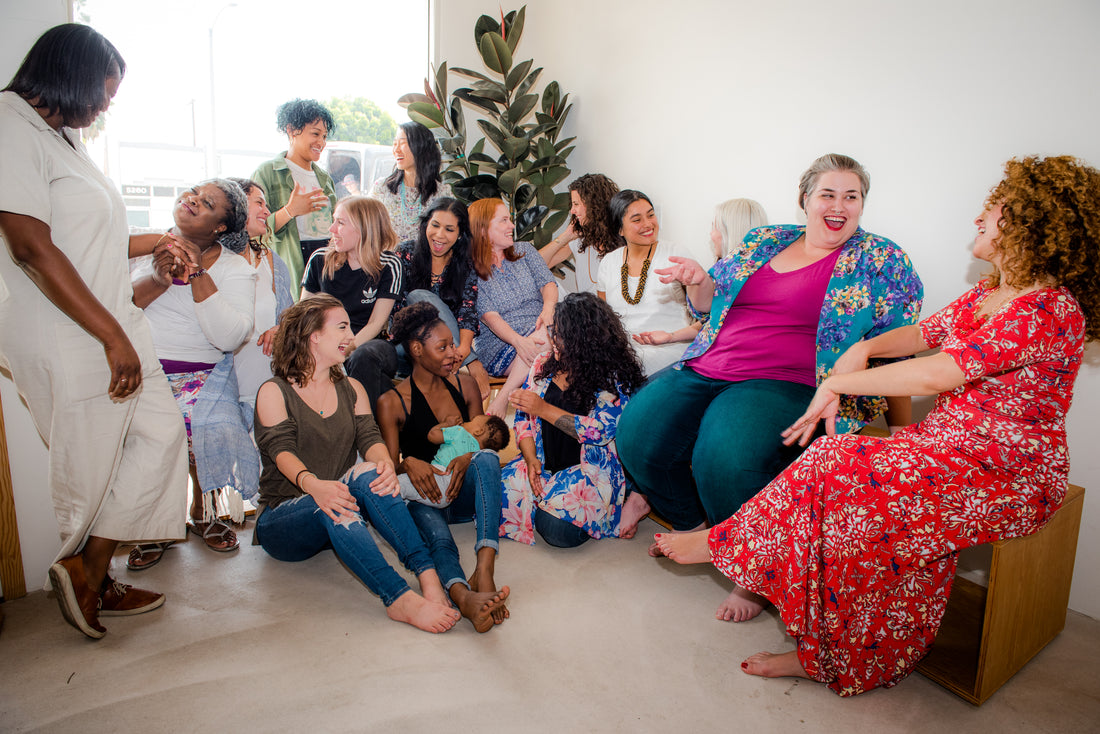As of March 2021, Doula Trainings International (DTI) has officially turned ten. We’re celebrating, commemorating and reflecting on a decade of doula work—a decade of learning, shifting, transforming, rebuilding, adapting and learning again and again.
Over the next few weeks, we invite you to join us as we look on the last few years. We’ll introduce you to our new team members, share what’s coming next for the future of DTI, as well as host fun giveaways and World Doula Week prizes (because why not?).
For now, here are five things that have marked the last ten years for our founders, Gina Giordano and Tara Brooke. As they transition out of day-to-day leadership at DTI, we’ll be carrying these lessons with us:
1.) Dream big for your industry.
When DTI started, there weren’t many other doula organizations outside of the traditional big three.
Our mission and the values we tried to cultivate within DTI put us out into the world, and ten years ago this felt like a risk—a much-needed, unique risk. Doing work that aims to change access, language and long-standing problematic healthcare systems is big work. It doesn’t come without constant learnings, call-ins and call-outs, redefining the day-to-day labor of it all and lots of conversation.
Staying curious has invited our work to evolve and we believe curiosity can keep any doula practice or organization sustainable.

2.) Doulas are advocates.
And to claim a role as an advocate, while facilitating culture change, is to re-imagine the role of doula work itself.
What does being a doula actually look like? What does providing support to someone else actually mean? For us, we’ve come to understand that the self-definition for doula must transform from passive to active supporter.
For context, we believe that doulas are not saviors. We can advocate for our clients, so that they have the opportunity to speak for themselves, identify their own desired outcomes and address their needs.
When we work from a place of advocacy, we are actively shifting the culture of birth by modeling a form of care that is rooted in humanity, autonomy and informed consent.

3.) Doula support is so much more than being a support person at birth.
Doula support is full-spectrum—the work encompasses overall reproductive care.
We know that the body is oppressed through patriarchy, racism, gender norms and values, sexuality and social structures. These experiences and systems inform our identities, our understanding of ourselves and our relationship to bodily autonomy. So, as doulas and reproductive health advocates, we must be knowledgeable in the full spectrum of reproductive care.

4.) Systems of oppression, white supremacy and discriminatory biases are to blame for the grave maternal and infant death rates in our country (and the world).
Over the last ten years, we have been updating our curriculum as we learn and identify our own blind spots. Our trainings explore systemic racism, barriers to care for all people, why gender-affirming language is critical, pushing back on the importance of certification vs training as a doula, the problematic use of medicalized language for doulas who are not clinical care providers, abortion as healthcare and the list goes on.
We’ve made these changes, because doula work and reproductive justice are inextricably linked. And we welcome future changes, too. Social change does not come from a place of comfort or ease—creating an environment in which every human being is respected comes from staying open to being wrong and learning anew.

5.) We cannot do our work without offering a scholarship program, checking our own privileges and acknowledging communities that need reproductive justice most.
Over the last ten years, our team has been working to bring our scholarship program forward. Now, the program awards free or discounted tuition to birth workers who identify as Black, Indigenous, people of color, trans, nonbinary, two-spirit and gender-non-conforming.
We’ve been able to make this happen through a slow but steady restructure of our operations. Today, 25% of all full paying members’ tuition feeds into scholarship funds.
Conversations around our scholarship program have also pushed our organization forward, namely toward addressing the harmful outcomes of trans-exclusionary feminism within birth work and the reproductive health world-at large.

Over the years, it has become clear that the foundation for DTI’s work is examining the injustices and privileges present in doula work and reproductive health—and that this foundation requires changing our own, as well as our communities’, understanding of sex, birth and parenting for all bodies.
So, thank you for sticking with us over the last ten years. Our educators have worked alongside us to train thousands of doulas, and we’re lucky to do what we do in such good company.
To our collaborators, our families and our admin team—we appreciate all that you do to make DTI trainings a reality.
Thank you,
Tara Brooke, DTI co-founder
Gina Giordano, DTI co-founder
Tiek Johnson, DTI Programs Director

